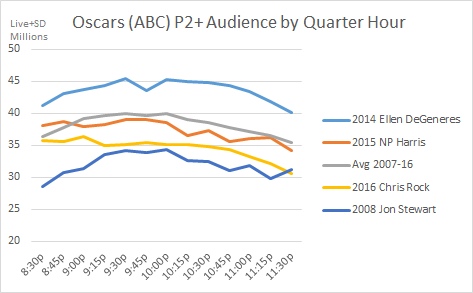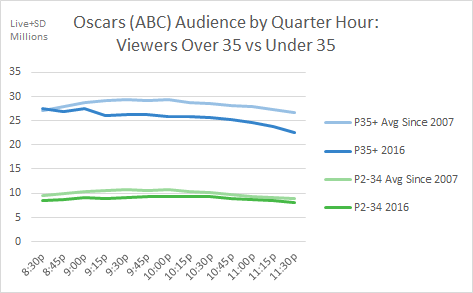The Oscars telecast on Sunday 2.28.2016 started right on par with recent telecasts, just above 35 million viewers for both 2016 and the average of every telecast since 2007. Generally speaking, the average Oscar show audience rises through the first hour, then holds steady until about 10:00 or 10:15 pm when the In Memoriam segment usually hits, and then declines steadily through the 10 and 11 pm hours before ending back up at around 35 million. (The average quarter hour audience pattern is the grey line in the chart below.) But the 2016 show (in yellow below) just never built: holding very steady until around 10:30 before dropping off like most other years as the late hour pushes people to bed.
The under-performance in the 2016 telecast is really generational, with major differences between viewers above or under 35. Both viewers 35+ and viewers 2-34 started very much in line with past years (with older viewers actually a touch above their multi-year average and younger viewers a touch below their lower respective average). But over the course of the telecast, younger viewers behaved exactly as we would expect based on past years, staying engaged at normal rates. It was the viewers over 35+ who experienced the fatigue that eroded this year’s rating. All viewers seemed interested in seeing how host Chris Rock handled the diversity controversy, but older viewers perhaps were more likely either to grow tired of the diversity topic or were more negatively effected by the change in format (moving the supporting actor and actress awards toward the end which resulted in the Mad Max: Fury Road technical awards marathon early on).
###
Related Posts
-
WEDNESDAY Ratings
Preliminary ratings are delayed by Nielsen until at least 9:30 am PT (90 minutes past due). The ratings service is performing extra “quality checks,” so be prepared for unusually high quality ratings later this morning!
-
The Sked: THURSDAY Ratings
Thursday night with comparisons:
-
The Sked: MONDAY Ratings
Monday fast nationals ratings:
-
The Sked: MONDAY Ratings
Monday fast national ratings:
-
The Sked: TUESDAY Ratings
Tuesday fast national ratings:






